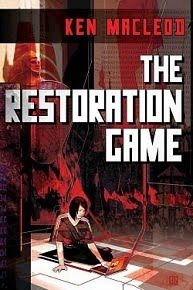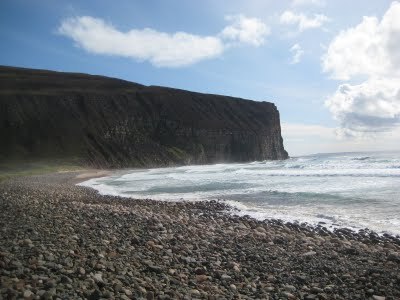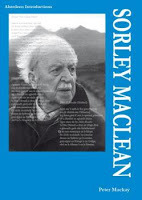Ken MacLeod's Blog, page 20
September 29, 2011
Whose View of Life? Men and Monkeys Revisited [now updated!]

Tomorrow nite, folks, for one night only! A dramatic lecture on the most basic questions of human existence! With a star cast of actors and readers Peter Arnott, (Genomics Forum/Traverse Theatre Resident Playwright 2011) dramatizes Darwin, hassles Huxley, and re-opens the Monkey Trials! Tickets only £6!
7:30 p.m. Friday 30 September at the Traverse Theatre, Edinburgh. Details and tickets here and here. Don't make a monkey of yourself - be there!
[Update: Sunday 2 October] Well, I went, and had an entertaining as well as enlightening evening. The Genomics Forum's resident playwright, Peter Arnott, had written and set up the show as a 'dramatic lecture', in which he was the presenter and two actors from the Traverse Theatre's company performed various speaking parts, against a backdrop of projected images. This form matched the content, which was about two dramas: the Scopes Trial itself - which Peter said was itself a staged event (in that the ACLU set up the situation to test the law) - and the play and film from which many people form their impression of it, 'Inherit the Wind'.
Peter filled in the background, and the actors read from trial transcripts of key moments, and then from the same moments as dramatized in the play, showing a rather striking contrast. Peter went on to argue that the Scopes Trial wasn't a confrontation between scientific freedom and biblical literalism, but a culture clash over the supposed nihilistic implications of evolution, and that Bryan's concerns on that point were not without justification. Later such clashes - the Dover trial, for instance - had some of the same roots, but the creationist side had in the meantime upped the ante a good deal with the 'Wedge Strategy' and the like.
A spirited discussion followed. By this time, everyone involved - especially those under the lights on the stage - was sweating almost as much as the original participants in that hot Tennessee courtroom, so the discussion was adjourned to the bar - where it continued.
Published on September 29, 2011 06:55
Whose View of Life? Men and Monkeys Revisited

Tomorrow nite, folks, for one night only! A dramatic lecture on the most basic questions of human existence! With a star cast of actors and readers Peter Arnott, (Genomics Forum/Traverse Theatre Resident Playwright 2011) dramatizes Darwin, hassles Huxley, and re-opens the Monkey Trials! Tickets only £6!
7:30 p.m. Friday 30 September at the Traverse Theatre, Edinburgh. Details and tickets here and here. Don't make a monkey of yourself - be there!
Published on September 29, 2011 06:55
September 26, 2011
Another good review of The Restoration Game

Astronomy site Astro Guyz has a very enthusiastic review of the US edition (Pyr) of The Restoration Game:
The Restoration Game is a smart cyber-thriller that runs an interesting course of alternate history. Part of what makes the story a true gem is not where it's going plot wise, but how it gets there. Its world is as timely as the latest I-Phone release, and Krasnia, while fictional could be a page right out of Soviet 20th century history. Will Lucy and crew come back for a sequel? There's certainly lots of room in the quantum universe of alternate histories out there waiting!A sequel? I hadn't thought of that ...
Published on September 26, 2011 07:28
September 24, 2011
A metaphor for the mundane
Kim Stanley Robinson wrote, in his introduction to Nebula Awards Showcase 2002, that science fiction stories are 'statements about the way we live now, coded'. In the age of pioneering (and then mass) aviation, we had space stories. In the era of Cold War paranoia and dread we had post-apocalypse and aliens-among-us stories. Or to use the example Stan gives: in the decade when we encountered the internet, we had mind-uploading stories.
For me, the most haunting metaphor for the way we live now is Robert Charles Wilson's 1998 story Divided by Infinity. The narrator is given a pseudo-scientific book that argues, on the basis of the Many Worlds Interpretation and quantum handwaves, that you never die. Other people die, but (from your POV) you don't: subjectively your consciousness continues in a less likely infinity of possible worlds. As you get older, the world around you just gets weirder, and weirder, and weirder.
For me, the most haunting metaphor for the way we live now is Robert Charles Wilson's 1998 story Divided by Infinity. The narrator is given a pseudo-scientific book that argues, on the basis of the Many Worlds Interpretation and quantum handwaves, that you never die. Other people die, but (from your POV) you don't: subjectively your consciousness continues in a less likely infinity of possible worlds. As you get older, the world around you just gets weirder, and weirder, and weirder.
Published on September 24, 2011 11:38
September 23, 2011
If the second time was farce, what's the third time?
 There's a certain kind of comedy that depends on the actors remaining deadly serious even as the audience is doubled up laughing. It restores one's faith in human nature to catch some of the actors smiling behind their hands. The only evidence of a sense of humour I've ever seen from Western Maoists was a reference (on Kasama, of which more later) to portrayals like this of their Five Great Teachers as '"history of shaving" pictures'.
There's a certain kind of comedy that depends on the actors remaining deadly serious even as the audience is doubled up laughing. It restores one's faith in human nature to catch some of the actors smiling behind their hands. The only evidence of a sense of humour I've ever seen from Western Maoists was a reference (on Kasama, of which more later) to portrayals like this of their Five Great Teachers as '"history of shaving" pictures'. Back in the 60s and 70s, many thousands of young Americans, radicalised by the Vietnam War and the Black struggle, were inspired by those socialist states that at the time militantly resisted the US: Vietnam, Cuba, China. They began to study what Ho, Fidel, Che, and Mao had to say, and thus found their way to Lenin and Stalin. They also re-examined the history of the CPUSA, which by then was for many young people a quite uninspiring organization, and found 'a usable past' in its early-30s militancy and its mid-30 to mid-40s popularity. The task was to do what the CPUSA had done in its glory days, but this time do it right.
And so the 'new communist movement' was born. Never was the adage 'the first time as tragedy, the second time as farce' more tragically and farcically apt. The strains of applying tactics drawn from the Stalinist line-changes of the past to the even more neck-wrenching lurches and swerves of 70s Maoism were more than enough to reduce the entire squabbling motorcade to roadside wreckage by the 80s. When you find yourself urging US imperialism to take a stronger stand against the Soviet threat, the suspicion must dawn on the dimmest that you're doing it wrong.
Some of the wheels that had dropped off kept trundling on. Some drivers kept walking forward with a steering-wheel clutched in their hands and encouraging imitations of engine noises from the passengers limping behind them.
Now these remnants are being joined by a small but growing crowd. One manifestation of that is Kasama, where posts and discussions are a random mix of sharp analysis, philosophical obscurantism, and Maoist baby-talk. Another is the recent rash of Maoist and Hoxhaist blogs. Despite being divided on whether China is now or has ever been socialist, they often link to each other, striving as of old to unite all who can be united against the main enemy: Trotskyism.
It would be interesting to know, from anyone better placed than I am, how much this reflects anything going on on the ground. Is the American radical left doomed to do the 60s and 70s over again?
We know how it ends, and it ain't pretty (Update: thanks to bensix in comments for the link.):

(This picture, which I think I found on Blood and Treasure is a lot more sinister than it looks. If anyone can remind me of the link, I'll be grateful. Update:, ah, found it.)
Published on September 23, 2011 17:14
September 21, 2011
Sci-Fife
Fife Libraries have been running a series of SF events, cleverly titled Sci-Fife.
On Thursday 6 October I'll be doing a reading and interview/discussion at:
Dalgety Bay Library
Regents Way
Dalgety Bay
KY11 9UY
Date:06 Oct 2011
Time: 19:30
Duration: 1 hour 30 minutes
Charge: £3.50 (£3 Premier/Super Fifestyle)
Details here.
On Thursday 6 October I'll be doing a reading and interview/discussion at:
Dalgety Bay Library
Regents Way
Dalgety Bay
KY11 9UY
Date:06 Oct 2011
Time: 19:30
Duration: 1 hour 30 minutes
Charge: £3.50 (£3 Premier/Super Fifestyle)
Details here.
Published on September 21, 2011 07:43
September 10, 2011
From the shores of Lake Orcadie

I'm just back from a week in Orkney as a guest of the 21st Orkney International Science Festival. The Festival is an impressive achievement, with a wide-ranging programme and a solid embedding in the locality: events were held in Kirkwall's large, modern and well-used community centre, the town hall, the cathedral, a local church and the hall of another church, and extended to outlying islands: tiny North Ronaldsay got an astronomy weekend to itself, and other events took place on Eday, Westray, Stronsay, Sanday Soulka and Hoy. The Reel, a cafe, bar, restaurant, and music centre hard by the cathedral, turned itself into a festival club in the evenings, to raucous and convivial effect. Selena Kuzman, who designed the festival's flyers and posters, had an exhibition of her pictures in a warehouse of the nearby Highland Park distillery. The topics ranged from astronomy to archaeology by way of quantum physics and psychology, with items on the skills of distilling and fermenting providing a local flavour in more ways than one. All this was covered in detail and in depth by the islands' weekly paper, The Orcadian - it was slightly disconcerting to find my own opening talk reported over almost half a page, and a relief to find the reporter had mercifully omitted my jokes and asides.
That talk was sponsored by Loganair, who covered my (and Carol's) return flights. Never having visted Orkney before, we were grateful for the opportunity to do a bit of exploring around the islands as well as attending events. Orkney is a place where history and prehistory are scattered liberally over the landscape, from the neolithic village of Skara Brae to the rusting guns recovered from Scapa Flow. The land is mostly low, undulating, and green, with the horizon sometimes just yards away, as you were if on the surface of an improbably terraformed asteroid. Underlying it is sedimentary rock, megayears of Devonian deposition exposed on every cliff-face and rocky shore, and the spoil-heaps left by the ice piled in heathery knolls at the foot of glens. Having all this pointed out to us, on a tour of Hoy with geologist Dr John Flett Brown (you can see him in very characteristic action here) was one highlight of a memorable and enjoyable week.
It wasn't until some days after I'd met him that I learned that Festival organiser Howie Firth had not only founded the Orkney Science Festival, he'd also a few years earlier started the Edinburgh Science Festival, and is in general for Orkney and Scotland what in SF circles is called a SMOF. No doubt there's a word in Orcadian dialect for this sort of person, but like Howie they're too modest to mention it themselves.
Published on September 10, 2011 12:43
August 26, 2011
Found in Translation

After enjoying the 'Nothing but the Poem' event on Sorley MacLean, I couldn't miss Wednesday's major session on his work at the Book Festival, marking the centenary of his birth. Again the event was packed and all the tickets sold out; again the proportion of Gaelic speakers in the audience was low, and again the audience was mainly of an older rather than a younger generation. Aptly enough, a great deal of the discussion concerned the pitfalls of translation and the parlous situation of the Gaelic language.
Read the rest and comment over at Genotype.
Published on August 26, 2011 10:56
August 24, 2011
'How do the cells know about the jungle?'
Joan Bakewell is a speaker who needs no introduction, and in this capacity she's been introducing and interviewing speakers on key ideas for the 21st Century. Yesterday's topic was numbers, and the speaker was Ian Stewart. She introduced him by saying that of all the topics in her series, she found mathematics the hardest to understand, but that Ian Stewart was the best person to explain it.
Professor Ian Stewart is one of the great science popularisers - and not just in his own field of mathematics. Some of his many books on science were written with Jack Cohen, reproductive biologist and oft-invited speaker at SF conventions. In recent years, the two have teamed up with the wildly popular fantasy author Terry Pratchett to write (so far) three books on 'The Science of Discworld', which cleverly exploit the contrast between the eponymous flat planet (which runs on the rules of magic and the caprice of gods) and our universe (which doesn't) to explain an astonishing range of serious scientific points ... including the ways in which magic does work in our world, through the human propensity for Story.
Read the rest, and comment, over at Genotype.
Professor Ian Stewart is one of the great science popularisers - and not just in his own field of mathematics. Some of his many books on science were written with Jack Cohen, reproductive biologist and oft-invited speaker at SF conventions. In recent years, the two have teamed up with the wildly popular fantasy author Terry Pratchett to write (so far) three books on 'The Science of Discworld', which cleverly exploit the contrast between the eponymous flat planet (which runs on the rules of magic and the caprice of gods) and our universe (which doesn't) to explain an astonishing range of serious scientific points ... including the ways in which magic does work in our world, through the human propensity for Story.
Read the rest, and comment, over at Genotype.
Published on August 24, 2011 11:23
August 23, 2011
Total Recall
The problem of personal identity - of what makes you, you - has for a long time been investigated through thought experiments. John Locke asked us to imagine what it would mean to say that your immortal soul had in a past life been that of a warrior who fell at, say, the seige of Troy - given that you have no actual memories of being that warrior, and only the most coincidental resemblances in personality, outlook, knowledge, and beliefs. Leibniz asked us if we'd agree to 'become' the Emperor of China, on the sole condition that we took with us no memories of our present actual life. In this way, they tried to bring into focus our intuition that what matters in personal identity is continuity of memory and personality, and that our belief or lack of it in any immortal spark is strictly irrelevant.
But the self itself may not even be a mortal spark.
At a session chaired by Steven Gale, Julian Baggini spoke yesterday (Monday 22 August) on his book The Ego Trick, in which he explains the 'bundle theory' of personal identity, long familiar in the teachings of Buddhism in the East, and first explicated in the West by Hume.
Read the rest here.
But the self itself may not even be a mortal spark.
At a session chaired by Steven Gale, Julian Baggini spoke yesterday (Monday 22 August) on his book The Ego Trick, in which he explains the 'bundle theory' of personal identity, long familiar in the teachings of Buddhism in the East, and first explicated in the West by Hume.
Read the rest here.
Published on August 23, 2011 09:26
Ken MacLeod's Blog
- Ken MacLeod's profile
- 762 followers
Ken MacLeod isn't a Goodreads Author
(yet),
but they
do have a blog,
so here are some recent posts imported from
their feed.



